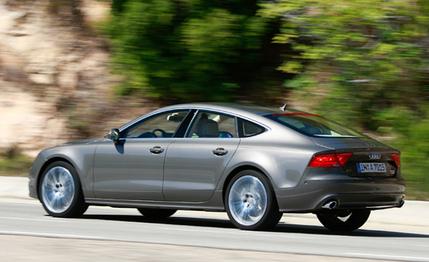 First Drive Review
First Drive Review
When automakers begin development on a new model, there are typically three or more competing design proposals, one of which is then chosen to make it into metal. This standard operating procedure was discarded with the Audi A7 Sportback, says Audi boss Rupert Stadler: "Everything was right in the first place." Indeed, this large hatchback could be the most beautiful of all Audis. Long, wide, and low, it’s styled with smooth and supremely clean lines. The front end is better proportioned than the latest A8's and seems cool and almost stoic—especially with the optional LED headlights. The side view recalls the most handsome (if not the most reliable) of 1970s hatchbacks, such as the Rover SD-1 and Citroën CX; the rear end is cut off sharply, like an Italian supercar of that same era. This car is free of the gimmicks you'll find on many others in this class, and we haven't talked to anyone who doesn't admire its looks.
Now that we've established that the A7 is beautiful, we’ll note that the car really is little more than a dressed-up, next-generation A6. It uses Audi’s modular longitudinal architecture; a good 20 percent of the A7’s body is made from aluminum, which is more heavily relied on in the more expensive A8, but most of the A7 is made from less costly steel.
Calm and Collected
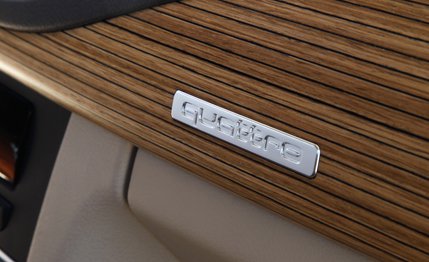
Our experience behind the wheel of the A7 bodes well for the next A6. The chassis glides over uneven roads with far more grace than before; this is a very comfortable car, with none of the harshness and forced sportiness that characterizes many other Audi models. The 114.7-inch wheelbase, up almost three inches over the previous A6’s, definitely helps in keeping body motions controlled and the cabin serene. But whereas the A7 can be considered a big car, at least in Europe, it doesn't mind being pushed through the corners. This is especially true for those versions equipped with the Quattro all-wheel-drive system, which feeds 60 percent of torque to the rear wheels as a default; as much as 70 percent can be shunted to the front and 85 percent to the rear. All U.S.-bound A7s will have Quattro.
Even without the optional sport differential, the A7 is agile when pushed. It stays neutral up to insane cornering speeds and never discourages you from playing. Audi's wheel-selective torque vectoring is so well programmed that the stability control has one of the lightest workloads of any of the systems in this car. Besides the 3.0 TFSI Quattro—the U.S.-bound configuration—we drove a front-wheel-drive 3.0-liter TDI. It is also predictable in its handling and fairly agile but ultimately tends toward understeer and is less quick to recover speed when exiting corners.
The 300-hp 3.0 TFSI is the same engine found in the current A6 and S4—it makes 310 hp in the former, 333 in the latter—and it remains great in the A7. Despite its misleading "TFSI" moniker, this V-6 is supercharged with a Roots-type blower. It’s smooth and responsive and delivers excellent performance, or so says Audi. The company claims an A7 thus equipped can achieve 62 mph in 5.6 seconds—we estimate that to be about right—and the top speed is governed at the customary 155 mph. In Europe, the 3.0 mates to a seven-speed wet dual-clutch gearbox, but we’ll get the same ZF-supplied eight-speed automatic found in the A8. The seven-speeder executes quick shifts, but the exhaust sound is subdued; this is clearly a luxury car with sportiness playing second fiddle—although it is, as noted, plenty capable.
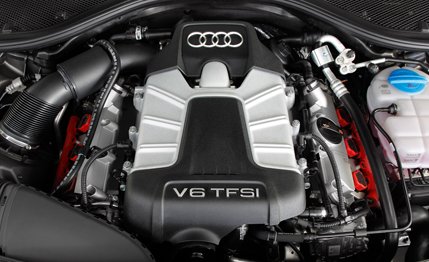
The most popular engine in Europe likely will be the 245-hp, 3.0-liter V-6 TDI Quattro (it’s the same engine as in the front-wheel-drive version we sampled, but it made a weaker 204 hp there). There also is an entry-level gasoline engine that is a naturally aspirated 204-hp, 2.8-liter V-6. The best engine is yet to come: a 4.0-liter turbocharged V-8 that will be available in the upcoming S7 and mated to the seven-speed dual-clutch S tronic gearbox. The S7 will arrive after the S8 sometime late in 2011, and it just might be worth waiting for. Of course, if you need a sportier look right now, Audi is happy to oblige with an S line package that adds boxier front air intakes, although we found them disrupting to the front-end aesthetics. No thanks.
Opulence and Simplicity
Inside, the A7 simultaneously oozes opulence and simplicity. The high center console creates a sporty, cockpit-like feeling; the instruments are clear and crisp; and the materials are, as usual for Audi, stunning. The aluminum and wood trim options could be considered an industry benchmark, with the layered oak being the most luxurious variation.
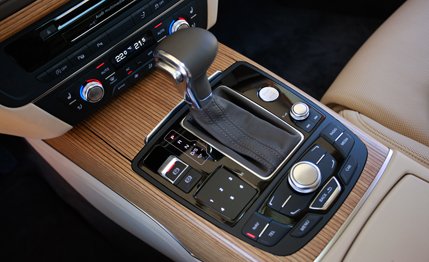
Complementing the A6-based mechanicals are lots of gadgets that first appeared in the flagship A8, including the touch pad that can detect fingertip handwriting and a feature whereby our test car constantly updated its navigation system with Google Maps data (we'd be interested in checking out the cellular data bill after the multiwave, two-week press launch). The A7’s head-up system is crisp and clear, and there is a full set of nanny and assistance systems, including radar sensors to detect slow or stopped vehicles ahead, blind-spot monitoring, active cruise control that can operate to and from a complete stop, and lane-keeping assist. The data fed into the latter helps in the event the car begins to slide by increasing or decreasing the power steering assist. We like the speed-limit-recognition technology, which displays road signs in the IP as you pass them—handy if you’re driving in unfamiliar locales—but we’re unsure if it will make it to U.S. models.
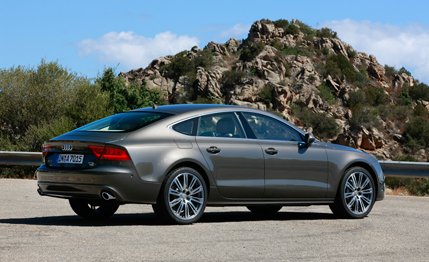
Speaking of U.S. models, expect them here next year, priced somewhere between $50,000 and $60,000. The A7’s most direct competitors are the Mercedes-Benz CLS, the second generation of which debuts at the Paris auto show, and the Porsche Panamera V-6. Others are the coupe-ish Jaguar XF, as well as the funky BMW 5-series GT. Whereas some are better to drive and all offer more or less similar levels of practicality, none wears sheetmetal that is as effortlessly sensual as the A7’s. And in a segment where styling is pretty much everything, that gives the Audi a leg up.